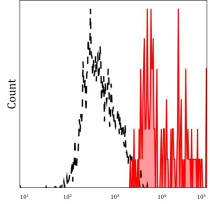ARG43866
anti-KIR3DL3 / CD158z antibody [CH21] (PE)
anti-KIR3DL3 / CD158z antibody [CH21] (PE) for Flow cytometry and Human
Overview
| Product Description | PE-conjugated Mouse Monoclonal antibody recognize KIR3DL3 / CD158z. |
|---|---|
| Tested Reactivity | Hu |
| Tested Application | FACS |
| Host | Mouse |
| Clonality | Monoclonal |
| Clone | CH21 |
| Isotype | IgG2a |
| Target Name | KIR3DL3 / CD158z |
| Antigen Species | Human |
| Immunogen | Transfectants of Human KIR3DL3 / CD158z |
| Conjugation | PE |
| Protein Full Name | Killer cell immunoglobulin-like receptor 3DL3 |
| Alternate Names | KIR3DL3; Killer Cell Immunoglobulin Like Receptor, Three Ig Domains And Long Cytoplasmic Tail 3; KIR3DL7; CD158Z; KIRC1; KIR44; Killer Cell Immunoglobulin-Like Receptor, Three Domains, Long Cytoplasmic Tail, 3; Killer Cell Immunoglobulin-Like Receptor 3DL3; CD158 Antigen-Like Family Member Z; Killer Cell Inhibitory Receptor 1; KIR3DL3 Killer-Cell Immunoglobulin-Like Receptor; Killer-Cell Immunoglobulin-Like Receptor 3DL3; Killer Cell Ig-Like Receptor KIR3DL7; KIR2DS2*00101-V; KIR3DL3*01403-V; CD158z Antigen; KIR2DS2 |
Application Instructions
| Application Suggestion |
|
||||
|---|---|---|---|---|---|
| Application Note | * The dilutions indicate recommended starting dilutions and the optimal dilutions or concentrations should be determined by the scientist. |
Properties
| Form | Liquid |
|---|---|
| Purification | Purified |
| Buffer | PBS (pH 7.4) and 15 mM Sodium azide |
| Preservative | 15 mM Sodium azide |
| Concentration | 0.1 mg/ml |
| Storage Instruction | Aliquot and store in the dark at 4°C. Keep protected from prolonged exposure to light. Do not freeze. Suggest spin the vial prior to opening. The antibody solution should be gently mixed before use. |
Bioinformation
| Gene Symbol | KIR3DL3 |
|---|---|
| Gene Full Name | Killer Cell Immunoglobulin Like Receptor, Three Ig Domains And Long Cytoplasmic Tail 3 |
| Background | Killer cell immunoglobulin-like receptors (KIRs) are transmembrane glycoproteins expressed by natural killer cells and subsets of T cells. The KIR genes are polymorphic and highly homologous and they are found in a cluster on chromosome 19q13.4 within the 1 Mb leukocyte receptor complex (LRC). The gene content of the KIR gene cluster varies among haplotypes, although several "framework" genes are found in all haplotypes (KIR3DL3, KIR3DP1, KIR3DL4, KIR3DL2). The KIR proteins are classified by the number of extracellular immunoglobulin domains (2D or 3D) and by whether they have a long (L) or short (S) cytoplasmic domain. KIR proteins with the long cytoplasmic domain transduce inhibitory signals upon ligand binding via an immune tyrosine-based inhibitory motif (ITIM), while KIR proteins with the short cytoplasmic domain lack the ITIM motif and instead associate with the TYRO protein tyrosine kinase binding protein to transduce activating signals. The ligands for several KIR proteins are subsets of HLA class I molecules; thus, KIR proteins are thought to play an important role in regulation of the immune response. This gene is one of the "framework" loci that is present on all haplotypes. |
| Function | Receptor on natural killer cells. May inhibit the activity of NK cells thus preventing cell lysis. |
| Cellular Localization | Cell membrane |
| Calculated MW | 45 kDa |
| PTM | Disulfide bond, Glycoprotein |
Images (1) Click the Picture to Zoom In






